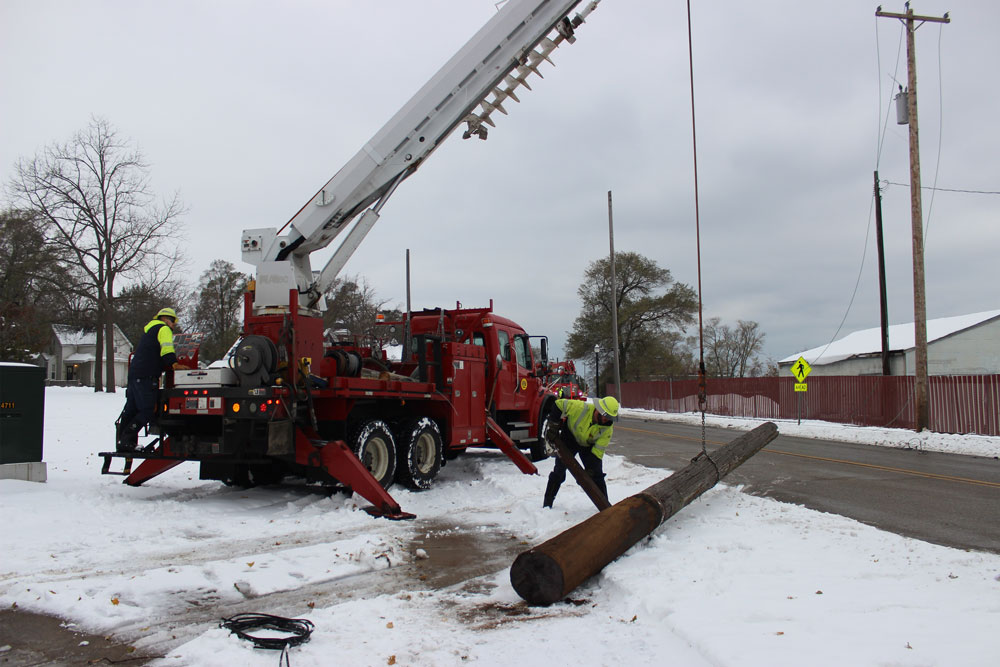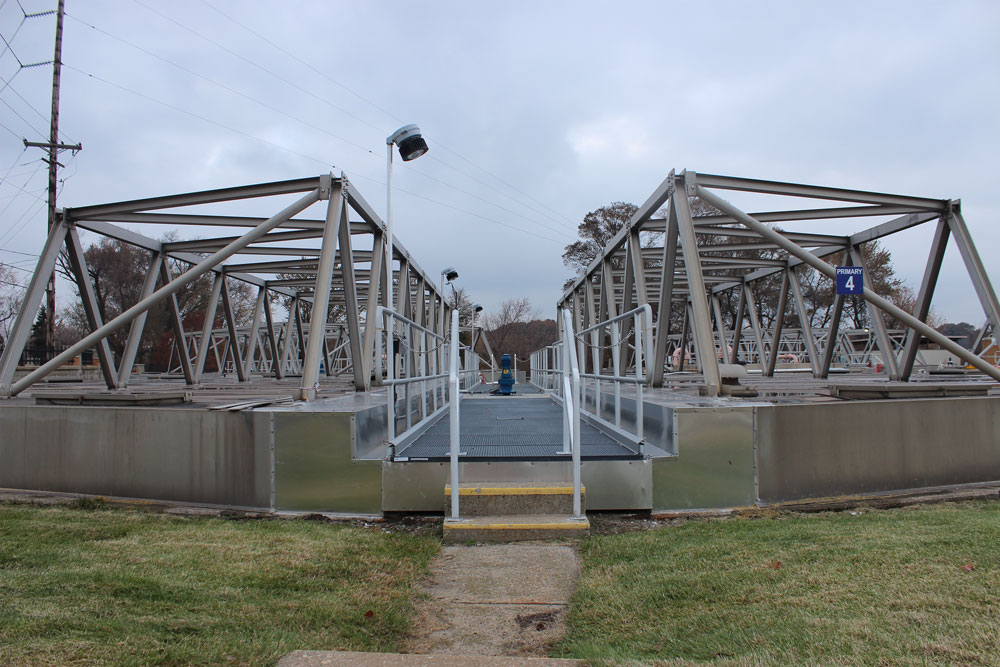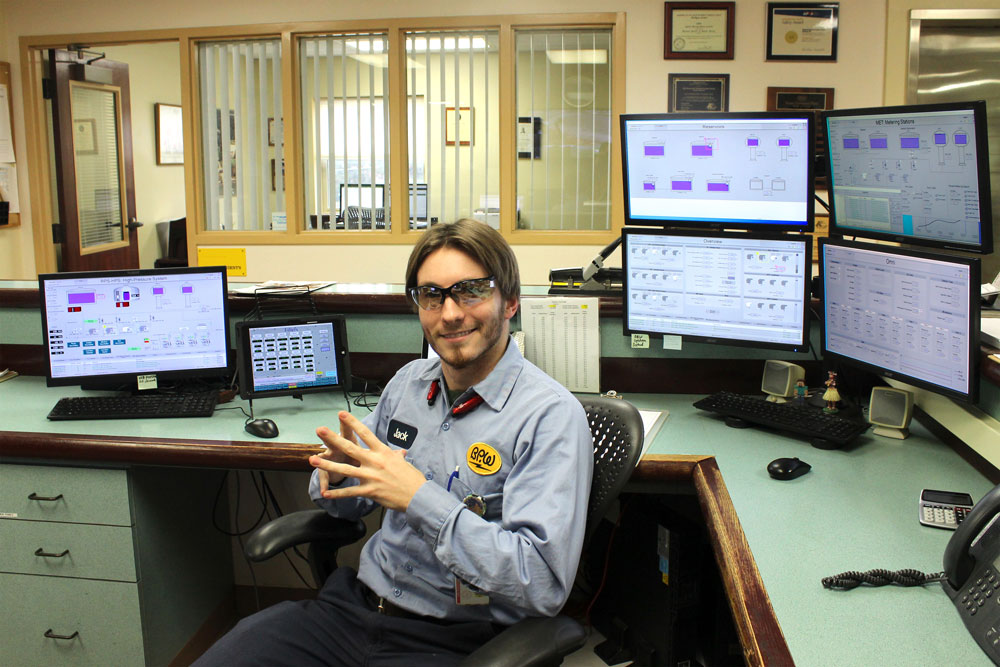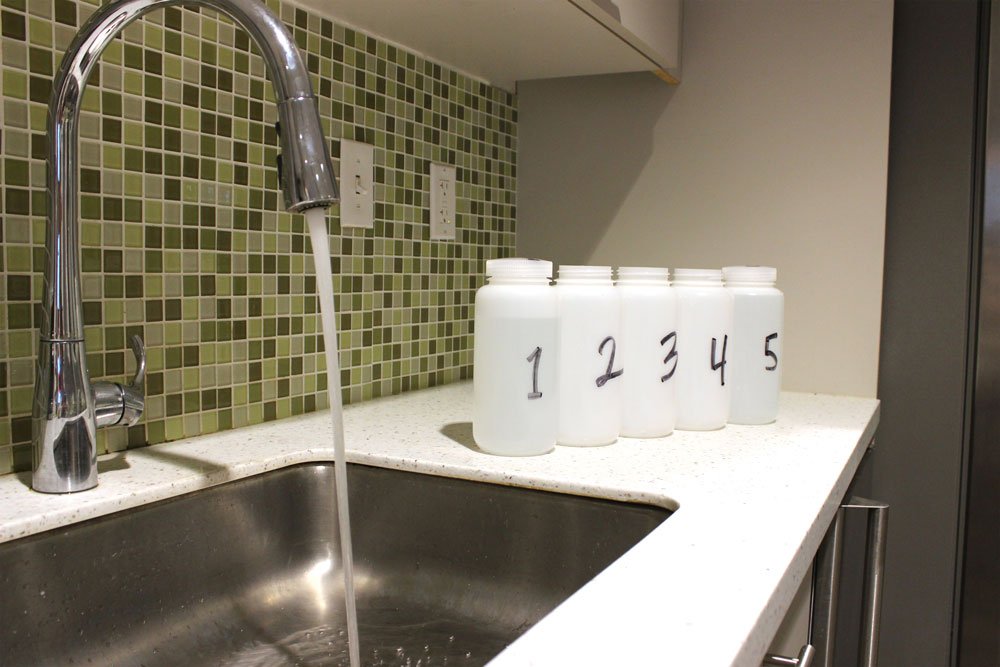Improving Operations
In 2019 we’ve invested in maintenance and upgrades to the existing infrastructure.

Power Lines Go Underground at Kollen Park
Kollen Park is a local favorite for outdoor recreation in Holland known as one of the city’s most beautiful parks. The waterfront front park is even lovelier now that power lines are out of sight in and around the park.
Overhead power lines along 8th Street from Washington to 11th Street, through the park, and the area along Kollen Park Drive, were converted to underground distribution. This infrastructure project improved reliability, safety and the aesthetics of the area. Aging poles that were due for an upgrade prompted the project.
“We recognized that the work was needed and had a vision for improving the waterfront,” said Lisa Kozlowski, electric distribution engineer.
Planning of the project took place during the 2019 fiscal year; construction work was completed early in the 2020 fiscal year.
Underground power makes a big impact on reliability and safety. Overhead lines are subject to weather, falling trees and wildlife that might cause a fault.
“The potential for those types of faults is eliminated with underground power distribution,” said Steve Bruinsma, electric distribution superintendent. “Underground is also safer because the chance for a power line to fall from above is no longer an issue.”
“This project is an example of what Holland Board of Public Works strives for when it comes to serving our customers. We are pleased to have the opportunity to improve a beloved community space while enhancing the reliability and safety of our electric distribution system,” explained Bruinsma.


Proper Maintenance Ensures Reliable Wastewater Service
The Holland Water Reclamation Facility (WRF) serves the greater Holland area is operated and maintained by the HBPW. WRF protects Lake Macatawa by removing pollutants from the sewage it receives through the wastewater collection system. The system includes many miles of sanitary sewers of various sizes that convey the wastewater to the WRF. Proper operation and maintenance of the collection system and the plant ensures reliability of the wastewater system.
HBPW has invested significantly into renewing its aging wastewater collection system with pipe replacement and relining. The 19th Street replacement project was 2019’s major accomplishment. Investments like this and an aggressive cleaning schedule ensures improved reliability with very few sewer backings each year.
“Investing in infrastructure and diligent maintenance practices plays a major role in the reliability of our sewer system,” said John Van Uffelen, utility services director. “We assess the condition of the system and plan replacement and maintenance projects far in advance to stay ahead of potential issues.”
Enhancements that made an impact at the WRF this year included equipment and control system upgrades. The primary clarifier equipment, circa 1980, was replaced with stainless steel materials that are coated to add longevity to the equipment. The waste pumping process was improved with new technology control upgrades.
“The overall result is safety and process improvements,” said Theo Van Aken, water reclamation facility superintendent.

Water Treatment Plant Upgrades Improve Precision
Holland Board of Public Works provides drinking water to the greater Holland area. Water is drawn from Lake Michigan to the filtration plant where it is treated and pumped to the distribution system and reservoirs.
The water treatment process begins in the sedimentation basins, where large impurities are removed; particles that are heavier than water settle to the bottom of the basin. Then, the water flows into rapid sand filters as water passes through a series of filter media that remove smaller and smaller particles, until it is ready to drink.
A highly complex plant control system runs the computers, pumps and valves that move, treat and test the water through the process. Teams of engineers and chemists closely monitor every stage using data and information provided by the technology.
This year, Holland Board of Public Works invested $1M in a major plant control system update.
“The previous system served us well for 20 years. The new technology is capable of a higher level of precision that provides a new scope of analytics. It gives us a deeper understanding of the water that is drawn from the lake,” said Jim Van De Wege, water treatment plant superintendent. “The ability to study the water with greater precision helps ensure that our customers can rely on health and safety of the water being delivered to their homes.”
Holland Board of Public Works continuously monitors the quality of water drawn from Lake Michigan. Closely monitoring the water for changes is a strategic measure.
“If a change were to occur, we want to know early in the game so we can address it head-on,” said Van De Wege. “The plant control system and software upgrade is an investment in reliability and safety for our community.”


Favorable Water Sampling Results for HBPW Customers
Holland Board of Public Works is required to sample water for lead and copper at residential services every three years. Sampling informs us about water quality in homes.
While no lead is present in the water provided by the HBPW, lead and copper can leach into the water through piping and fixtures that contain lead. Understanding water quality at the point of use is important because this is where people come in contact with the water. Samples are collected from residents and tested for lead and copper at certified laboratories. Participation in the sampling program by residents is voluntary.
“We target homes where detectable events would be more likely to occur, like ones with galvanized services with lead goosenecks, or homes built before 1990 that were plumbed with lead based solders,” said Alison Morsink, Water/Wastewater Services Supervisor.
Holland Board of Public Works sends postcards to customers explaining the purposes for the water sampling and asking for participation in the sampling program. Participants receive a sampling kit and training over the phone for how to retrieve the sample. The sampling kit contains bottles and caps.
Morsink explained, “Most customers are happy when we approach them about testing their water and want to know if there is a water quality problem. Fortunately, results in 2019 have all been well below Action Levels (AL) for Lead and Copper.”
An Action Level is the concentration of a contaminant, which if exceeded, triggers treatment or other requirements that a water system must follow.
Holland Board of Public Works has never found levels of lead or copper in its drinking water that exceed federal and state standards and is proud provide high quality water to the our customers. Reliable water service is critical to the quality of life in our community.

“Shared Gigabit”
Broadband Service
Holland Board of Public Works (HBPW) is dedicated to providing our community with quality infrastructure to deliver affordable and reliable utility services. In 2017 HBPW deployed an expanded broadband pilot in Downtown Holland, also known as Shared Gigabit service. The pilot was a success that has piqued the community’s interest.
Shared Gigabit service started because of a demand for high-speed reliable broadband service by residents and small businesses in the downtown area. The project has met demand and continues to see a steady growth in customers.
HBPW looked at the expanded pilot project as an opportunity to gain knowledge about the challenges and best practices for building the “the last mile,” the final leg of a telecommunications network. While discussions about expanding the fiber optic network are on-going, HBPW studied the results of the pilot with purposeful diligence.
“We dedicated 2019 to understanding the ins and outs of delivering Shared Gigabit service to the end user,” remarked Becky Lehman, technology director.
Our experience with the downtown expanded pilot project provided first-hand knowledge on how important it is to focus on customer needs and expectations. Setting expectations up front with customers on what they could expect for timing and costs was critical.
“Now that the service has been operational for a while, we have had opportunities to follow up and make sure customers are satisfied,” Lehman explained. “Many customers have appreciated the personal attention that we are committed to providing.”
“We have heard customers comment that they don’t want to move because their fiber-based broadband service is so good,” explained Pete Hoffswell, broadband services manager.
“Our customers are very satisfied with the ability to upload at high-speeds,” said Hoffswell. “Tech-based companies in particular have a need for reliable, fast upload speeds. Sharing large files with clients used to be a very slow process for those companies. Our customers now regularly surprise their clients with how quickly they can deliver content.”

